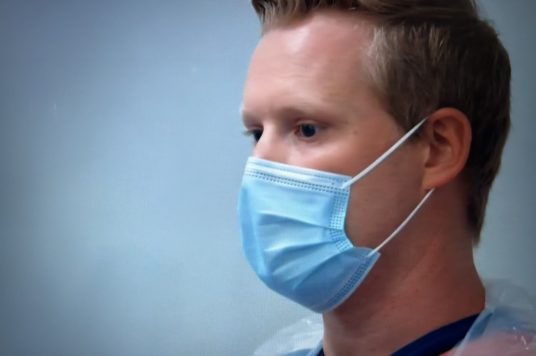C4 Emergency meet the team: Rich Carden, Emergency Medicine Registrar
Emergency series two continues at 9 pm on Channel 4 tonight (Tuesday 22 August).
We caught up with those in #TeamStGeorges that star on the show. Meet Rich Carden, Emergency Medicine Registrar.
Describe your role – what’s involved in a typical day, if such a thing exists?
I am a trainee in both emergency medicine and intensive care medicine – so my day job varies depending on where I am! The ED can be a chaotic environment and my job as a registrar is varied. Some days I will oversee an area of the department, some days I will be in the paediatric department, and some will be spent in the resuscitation area (my favourite part of the department). Our job is to provide the initial assessment and investigation of any patient presenting to the department. When I’m on the intensive care unit I spend my day working as part of team caring for the most unwell patients in the department, many of which will require organ support.
Describe the cases you were involved in during this series of Emergency?
I helped look after a young man who had suffered a head injury as a result of an accident whilst riding his motorcycle. He had clear signs of a head injury and was required to be admitted to intensive care.
What are the biggest challenges in your job?
The biggest challenge of working in healthcare is trying to not be affected by the cases you are involved in. It can be hard to distance yourself emotionally from some of the things we are exposed to.
How do you cope with the demands of your job – mentally, physically and emotionally?
I consider myself to be resilient which helps, but I have a wonderful wife Jen, and two young girls Coco and Sienna, who keep me busy, and my mind occupied! My wife is also a doctor, and it helps to have someone at home who I can talk to.
What do you hope viewers will learn about trauma care and what do you hope they will take away from watching Emergency?
I hope viewers can appreciate just how many people are involved in the care of patients with critical injuries. The London Major Trauma System is a wonderful example of the NHS working at its best.
When did you get involved in The London Major Trauma System?
I have been involved in the London Major Trauma System since I moved to London in 2015. Since being in London I have worked at 3 of the 4 Major Trauma Centres and have completed a PhD in Trauma Sciences under the supervision of Prof Karim Brohi, who is the director of the Trauma System.
What motivated you to get into this side of medicine and what are the things you love most about your job?
I enjoy caring for the sickest patients. I feel I can make a meaningful impact to both them and their families. I think initially I was drawn to the excitement of caring for injured patients, but now recognise there is much more to looking after these patients and supporting them and their families through their often long journeys.
If you weren’t in medicine, what do you think you’d be doing?
I wonder this from time to time and think I’d probably want to do something outdoors, maybe landscape gardening, or something to do with boats – although I’ve seen a fair few accidents from this line of work.



